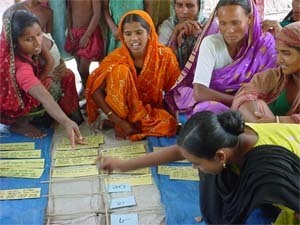
Picture taken by APB-CMX, Bangladesh, 2004. The picture shows a PRA ranking exercise conducted by Kamal Kar. The participants were women members of a Farmer Field School organised by CARE.
Participatory appraisal (PA) developed in Africa where it was known as participatory rural appraisal and so it is sometimes called PRA. Someone experienced PRA in Africa and brought it back to Humberside during the nineties and developed it into PA, an approach for urban communities in the UK. It is essentially an approach that combines research with community development, recruiting everyone into building, owning and controlling their own information about their neighbourhoods.
Its big advantage is flexibility. PA can be used indoors or outdoors, with small or large groups, informally (eg table to table in a pub or café or on the street) or formally at a meeting designed for the purpose. It can be used with people of all ages and I’ve yet to find a minimum or maximum age!
The main disadvantage is you need training for your facilitators and they need lots of experience to do it properly. They need to understand the tendency for groups drift away from a participatory approach, despite their best intentions. Think of PA as a video game. Game over means you can restart and use what you have learned to progress further next time. Very few of us really understand participation and so we learn by doing and reflecting.
Initial training typically takes five full days. I have posted about PA and courses available in the UK. The news is not good at present and I am not aware of any courses I can recommend.
Leaders tend to dominate meetings and impose their views upon others. This applies to everyone including the practitioners of PA. Therefore practitioners need to be alert to their own practice and when they start to be directive. For this reason practitioners rarely work alone, so that at least one other can observe what is happening and discuss it afterwards.
I remember working with children in a class at a school. A woman who was a powerful leader in her own community partnered me and we asked the children to draw a map of their neighbourhood. We agreed I would interrogate the map. When the children were ready my partner grabbed the pens and started to interrogate the map. There was little I could do other than take on the observer support role. At the end of the session my partner asked me what I thought of her performance. I told her and gave examples of where she had been directive. She was not impressed. A couple of days later, at the end of the training course, she told me she had reflected on what I said and it had been helpful.
I tell this story to illustrate the honesty and trust required to make PA work but it is worth it.
The thing that attracts many people to PA is its tools. These are approaches to helping people voice their concerns and ideas. You can also develop your own tools. Most tools use large sheets of flipchart paper and the idea is to make sure everyone has access to pens and uses them. Some people claim they can’t draw and ask others to draw on their behalf. I’ve generally found that once people get started they’ll get into it and then almost nothing will stop them.
The thing that will stop them is a dominant person, who can impose their authority on a group in seconds. “We know the answer to that.” So, the third essential following training and tools is experience. You need to be able to see when people are domineering (and they’re often charming people) and work out ways to neutralise their effect. So, in the classroom I mentioned earlier, one of the practitioners asked the teacher to draw a map. We agreed this in advance. The teacher claimed to know exactly what was going on but co-operated because it did stop her interfering and she wanted to hear the results as much as we did. But note without our intervention she might have walked around the class and made comments. We showed her how to be most helpful. Some dominant people are sensitive and some aren’t. Good luck!
Personally I like going out in the freezing cold with flipchart paper and pens and asking people to map their area. For some reason I find it hard to persuade others to join me. I don’t think it’s the cold that puts them off. Listening to people is costly to start with but infinitely rewarding.
Most participative methods can be wrecked by charming leaders. How have you helped them stand aside? Are you aware of courses you can recommend?